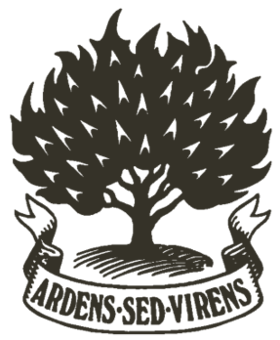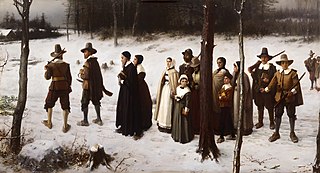Related Research Articles

Presbyterianism is a part of the Reformed tradition within Protestantism that broke from the Roman Catholic Church. Presbyterian churches derive their name from the presbyterian form of church government by representative assemblies of elders. Many Reformed churches are organised this way, but the word Presbyterian, when capitalized, is often applied to churches that trace their roots to the Church of Scotland or to English Dissenter groups that formed during the English Civil War.

The Presbyterian Church (USA), abbreviated PC (USA), is a mainline Protestant denomination in the United States. It is the largest Presbyterian denomination in the country, known for its liberal stance on doctrine and its ordaining of women and members of the LGBT community as elders and ministers. The Presbyterian Church (USA) was established with the 1983 merger of the Presbyterian Church in the United States, whose churches were located in the Southern and border states, with the United Presbyterian Church in the United States of America, whose congregations could be found in every state.
Christian fundamentalism, also known as fundamental Christianity or fundamentalist Christianity, is a religious movement emphasizing biblical literalism. In its modern form, it began in the late 19th and early 20th centuries among British and American Protestants as a reaction to theological liberalism and cultural modernism. Fundamentalists argued that 19th-century modernist theologians had misunderstood or rejected certain doctrines, especially biblical inerrancy, which they considered the fundamentals of the Christian faith.

The Presbyterian Church in America (PCA) is the second-largest Presbyterian church body, behind the Presbyterian Church (USA), and the largest conservative Calvinist denomination in the United States. The PCA is Reformed in theology and presbyterian in government.

The mainline Protestant churches are a group of Protestant denominations in the United States and in some cases Protestant denominations in Canada largely of the theologically liberal or theologically progressive persuasion that contrast in history and practice with the largely theologically conservative Evangelical, Fundamentalist, Charismatic, Confessional, Confessing Movement, historically Black church, and Global South Protestant denominations and congregations. Some make a distinction between "mainline" and "oldline", with the former referring only to denominational ties and the latter referring to church lineage, prestige and influence. However, this distinction has largely been lost to history and the terms are now nearly synonymous.

Princeton Theological Seminary (PTSem), officially The Theological Seminary of the Presbyterian Church, is a private school of theology in Princeton, New Jersey. Founded in 1812 under the auspices of Archibald Alexander, the General Assembly of the Presbyterian Church (USA), and the College of New Jersey, it is the second-oldest seminary in the United States. It is also the largest of ten seminaries associated with the Presbyterian Church.

Harry Emerson Fosdick was an American pastor. Fosdick became a central figure in the Fundamentalist–Modernist controversy within American Protestantism in the 1920s and 1930s and was one of the most prominent liberal ministers of the early 20th century. Although a Baptist, he was called to serve as pastor, in New York City, at First Presbyterian Church in Manhattan's West Village, and then at the historic, inter-denominational Riverside Church in Morningside Heights, Manhattan.

The Free Presbyterian Church of Ulster is a Calvinist denomination founded by Ian Paisley in 1951. Doctrinally, the church describes itself as fundamentalist, evangelical, and separatist, and is part of the reformed fundamentalist movement. Most of its members live in Northern Ireland, where the church is headquartered, and in County Donegal. The church has additional congregations in the Republic of Ireland, Great Britain and Australia, and a sister denomination in North America, the Free Presbyterian Church of North America, which has congregations in Canada and the United States. It also has a sister denomination in Nepal which was formed from the Nepal mission to the Unreached in November 2013.

Redeemer Presbyterian Church (PCA), is a church located in New York City, founded in 1989 by Timothy J. Keller, who retired as pastor in July 2017. The family of Redeemer churches includes Redeemer Downtown, Redeemer West Side, Redeemer East Side, Redeemer Lincoln Square, and Redeemer East Harlem. Christianity Today called Redeemer "one of Manhattan's most vital congregations."

The fundamentalist–modernist controversy is a major schism that originated in the 1920s and 1930s within the Presbyterian Church in the United States of America. At issue were foundational disputes about the role of Christianity; the authority of the Bible; and the death, resurrection, and atoning sacrifice of Jesus Christ. Two broad factions within Protestantism emerged: fundamentalists, who insisted upon the timeless validity of each doctrine of Christian orthodoxy; and modernists, who advocated a conscious adaptation of the Christian faith in response to the new scientific discoveries and moral pressures of the age. At first, the schism was limited to Reformed churches and centered around the Princeton Theological Seminary, whose fundamentalist faculty members founded Westminster Theological Seminary when Princeton went in a liberal direction. However, it soon spread, affecting nearly every Protestant denomination in the United States. Denominations that were not initially affected, such as the Lutheran churches, eventually were embroiled in the controversy, leading to a schism in the United States.

Charles Curtis McIntire Jr., known as Carl McIntire, was a founder and minister in the Bible Presbyterian Church, founder and long-time president of the International Council of Christian Churches and the American Council of Christian Churches, and a popular religious radio broadcaster, who proudly identified himself as a fundamentalist.
The Evangelical Presbyterian Church was a Reformed denomination founded in 1956.
John A. Mackay was a Presbyterian theologian, missionary, and educator. He was a strong advocate of the Ecumenical Movement and World Christianity.

Protestantism is the largest grouping of Christians in the United States, with its combined denominations collectively comprising about 43% of the country's population in 2019. Other estimates suggest that 48.5% of the U.S. population is Protestant. Simultaneously, this corresponds to around 20% of the world's total Protestant population. The U.S. contains the largest Protestant population of any country in the world. Baptists comprise about one-third of American Protestants. The Southern Baptist Convention is the largest single Protestant denomination in the U.S., comprising one-tenth of American Protestants. Twelve of the original Thirteen Colonies were Protestant, with only Maryland having a sizable Catholic population due to Lord Baltimore's religious tolerance.
James Oliver Buswell, Jr. was a Presbyterian theologian, educator and institution builder.
The church was a result of a split in the Presbyterian Church in Chile. The National Presbyterian Church in Chile was formed on July 2, 1944 in Santiago de Chile at the Holy Trinity Church. The attendance was about 500. At that time young Chilean leaders argued that the Presbyterian Church in Chile become an elitist church and not interested in growth and evangelism. In 1945 the church adopted the name of the National Evangelical Presbyterian Church. The church was supported by Dutch, Korean and Australian missionaries. In 1960 the church suffered a split, the National Fundamentalist Presbyterian Church was founded.
The Presbyterian Church in America, Chile is a confessional Presbyterian denomination, created by the Presbyterian Church in America missionaries and it currently has 5 congregations.
The Korean Christian Fundamentalist Assembly is a Presbyterian and Reformed denomination in South Korea founded in 2014 under the influence of Rev. Gerald Jones who graduated from Bob Jones College and came to Korea and established the Maranatha Seminary. The Fundamentalist teaching found favorable ground in Korea. Ian Paisley and Bob Jones organised the World Fundamentalist Conference in Edinburgh. The church adheres to the Apostles Creed and Westminster Confession. In 2004 it had 18,262 members and 116 congregations.
References
- ↑ "Church History" (in Spanish). Retrieved April 4, 2014.
- ↑ "Chile". 2002. Retrieved April 4, 2014.
- ↑ "What we believe" (in Spanish). Retrieved April 4, 2014.
- ↑ "Presbyterian churches" (in Spanish). Archived from the original on April 7, 2014. Retrieved April 4, 2014.
- ↑ "Organization" (in Spanish). Retrieved April 4, 2014.